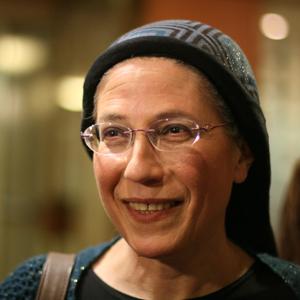New Class of Israeli Lawmakers Include First Ever Hebron Representative
Orit Struk is the first person from the Jewish settlement in the West Bank city of Hebron to be elected to Israel’s Knesset. (Photo: Daniella Cheslow)
Israel’s new parliament convened for the first time this week. The newly elected crop of lawmakers includes lots of new faces. Forty-eight out of a total 120 seats in the Knesset will be freshman.
There are also a record number of women — 27.
And a record number of lawmakers who live in Jewish settlements in the West Bank. One of them is the first to be elected from the controversial settlement in the city of Hebron.
Her name is Orit Struk. She’s a 52-year-old with 11 children and a dozen grandchildren. Three of her young daughters accompanied Struk earlier this week, when she arrived for the swearing-in ceremony at the Knesset building in Jerusalem.
When asked how it felt to be at the ceremony, Struk said, “It’s very exciting. It’s a blessing to God that we’ll be able to do only good things, God willing.”
Struk’s religious language matches her appearance. Her covered head, long sleeves and ankle-length skirt are a striking contrast in this flashy crowd of Israeli political elites. But that’s the standard uniform, so to speak, worn by many religious Israeli women from West Bank settlements.
Some 350,000 Israelis live in Jewish settlements across the West Bank. But Hebron — or Hevron in Hebrew — isn’t just any settlement.
One reason why: The Cave of the Patriarchs. It’s where Abraham and his family are believed to be buried. And the site is located in the heart of the old city.
“First of all, Hevron is the first Jewish city in the land of Israel. Jews have lived here almost continuously for, for almost 4,000 years,” said David Wilder, spokesman for the Jewish community in Hebron.
“And the significance of Hevron is not just for the Jewish people. I think anybody that believes in one God, this is where it started. This is the roots of monotheism. Abraham was able to reveal the existence of one God and all of the major western religions are based upon that. That’s the starting point,” Wilder said.
And it’s what motivates Orit Struk. Spending time at the Knesset is nothing new for her. She’s long worked as a lobbyist for the West Bank settlements. But now that she’s an elected member of the Knesset, Struk is in a different position to help realize a certain dream for the future of Hebron.
“God willing,” Struk said, “Hebron will be a city in Israel where tens of thousands, or maybe hundreds of thousands of Jews, live. And it will be open to people of all religions to visit.”
Struk wants to retroactively legalize dozens of settlement outposts built without government permission. She and her colleagues with the Jewish Home party are also opposed to the creation of a Palestinian state. For them, Judea and Samaria — the names that religious Jews use to refer to the West Bank — is, and always will be, part of Israel.
Palestinian Muslims also revere the final resting place of Abraham in the city of Hebron, which they call al-Khalil. They know this same holy site as the Ibrahimi Mosque. But Palestinian movement is severely restricted near the mosque and the old city, which is a few minutes walk from the Jewish settlement where Orit Struk and her family live.
The treatment of Palestinians in Hebron is one of the reasons why her ascension to the Knesset isn’t welcomed by all.
Yehuda Shaul served as an Israeli soldier in Hebron. Now he’s with “Breaking the Silence,” an advocacy group that’s opposed to Israel’s occupation of the West Bank. He said of Hebron, it’s “the place where our great past meets our disgusting present and future.”
“I think this is a very sad moment in the story of our society, that communities like this sit around the table and will be part of the people who make our laws, the laws under which I live,” he said.
For Shaul, the Jewish settlers of Hebron represent an extremist ideology that is damaging to Israel itself. And that’s why he sees the election of Orit Struk to parliament as a dangerous development.
“Look, today in Hebron you have 850 settlers in a city center of 175,000 Palestinians. Guarding them, you have 650 combat soldiers. Forty-two percent of Palestinian families have fled the area, because they couldn’t continue to have any kind of ordinary life,” Shaul said.
But Orit Struk and her supporters respond to that by saying the results of the recent Israeli election speak for themselves.
Hebron spokesman David Wilder said, “People think that we’re monsters. People think that, you know, we’re not people, that we’re some other species. And it’s not true.”
Not that Wilder cares all that much what people think. He said the real test for Orit Struk and her colleagues will be what they can accomplish in parliament. Then, there will be another election.
